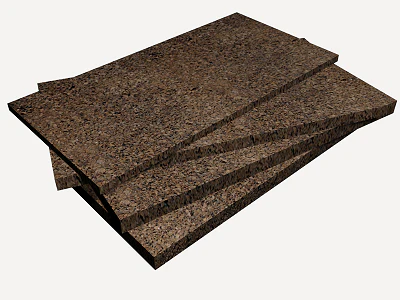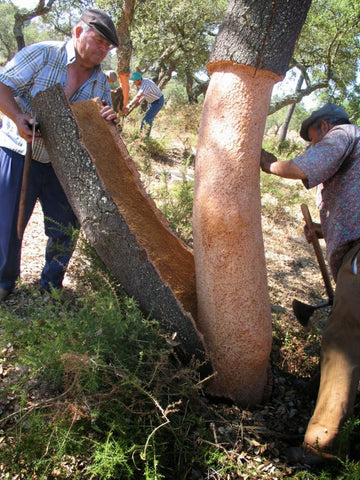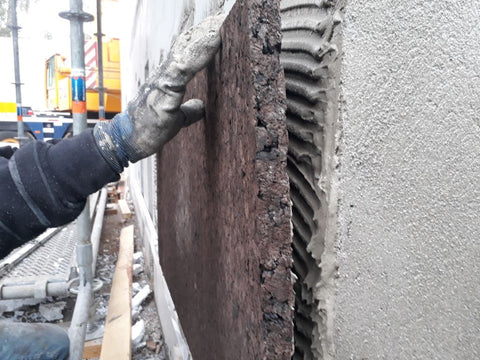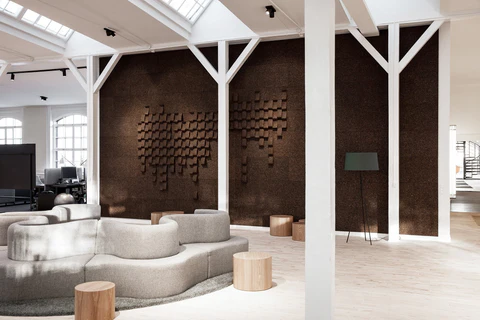Cork is an ecological and renewable material that can be used in various applications in the construction sector. Thanks to its excellent properties, it is perfect for use as insulation. At Isolcork, we offer expanded cork agglomerate, a versatile, high-quality material that can be used indoors and outdoors, on floors, walls, and ceilings. It contributes significantly to improving the thermal and acoustic comfort of buildings, as well as providing an unparalleled aesthetic finish.
The cork agglomerate manufacturing process is based on expanded cork granules by steam injection at 360°C, without the addition of synthetic products as a binder, since its own natural resins act as such. In addition, during the cooking process, the cells expand and as they increase in volume, the insulating properties of the cork are increased.
On the other hand, the energy used for production comes almost entirely from biomass, and all manufacturing waste can be reused, so raw material waste is zero. In addition, when the material is removed from a construction site, it can be fully recycled, giving it a second useful life. Therefore, it is a material that does not pollute, having an optimal life cycle, since it can be recycled and reused. Furthermore, the cork oak trees where the raw material is extracted responsibly are very good at capturing CO2 from the atmosphere, so the carbon footprint of the cork agglomerate is quite low.
Cork agglomerate is becoming a trending material for sustainable construction, standing out from other conventional insulating materials because it is 100% natural and offers a wide range of properties, the main ones being:
- Thermal insulation: Thanks to the high air content, the size of its cells, and the low absorption capacity of this material, it is a very good thermal insulator. It provides insulation with efficient performance, resulting in improved performance of the envelope, optimizing the energy performance of the building..
- Acoustic insulation: Thanks to its low density and high porosity, cork absorbs most sound waves, delivering excellent acoustic performance. It limits the transmission of noise through insulation and mitigates the reverberation times of a space, providing acoustic comfort to the building’s occupants.
- Impermeability: The suberin present in the cork cells makes it impermeable to liquids and gases, which allows the insulating capacity of this material to be preserved.
- Dimensional stability: Cork has very good compressive strength and is also flexible, so agglomerated cork panels can withstand high pressures without permanent deformation. Furthermore, they can withstand strong temperature fluctuations without warping.
- Fire resistance: Cork agglomerate reacts very slowly to fire, due to the surface carbonization it undergoes and its high insulating properties. Furthermore, it does not emit toxic fumes when burned, which is a major advantage over other materials.
- Durability: Cork agglomerates are a very resistant material and remain in perfect condition, maintaining ther insulation properties throughout their life cycle.
Cork agglomerate panels can be used in various construction applications, whether vertical or horizontal, including floors, walls and roofs.
In addition, they can be used both inside and outside, being a very good alternative for implementation as insulation for the EIFS system.
While it’s true that cork is most widely sold in more environmentally conscious countries, Isolcork’s cork solutions are currently becoming well-known, as they are a very good alternative for sustainable construction, contributing to the high energy efficiency and sustainability requirements required by certifications. Cork is undoubtedly a material worth investing in. Its excellent properties, sustainability, and aesthetic possibilities make it one of the most promising insulation materials in the world for the future of construction.







